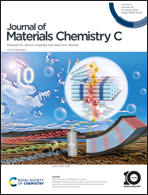Temperature and environmentally stable titanium carbide as an electron-selective heterocontact for crystalline silicon solar cells†
Abstract
Dopant-free carrier-selective contacts (CSCs) are promising for application in crystalline silicon (c-Si) solar cells to enhance efficiency by optimizing carrier collection from lightly doped silicon wafer while avoiding the efficiency losses due to heavy doping. However, the industrial applications of these materials have been constrained by their inadequate thermal stability and reliability. Thermally stable titanium carbide (TiCx) is proposed as a novel electron-selective contact (ESC) material for n-type c-Si solar cells and achieves an extremely low contact resistivity of 4.24 mΩ cm2, significantly reduces the series resistance of n-type c-Si solar cells to 0.22 Ω, and improves efficiency by 2.6%, resulting in a champion efficiency of 17.37%. TiCx ESC-based n-type c-Si solar cells maintain 91% of the initial performance after 770 °C thermal annealing and exhibit excellent reliability in tests such as light soaking, damp heat, and highly accelerated temperature and humidity stress tests. This is the first application of metal carbide as a CSC material in c-Si solar cells and demonstration of a thermally stable and reliable carrier-selective contact that endures the maximum process temperature of current industrial solar cells. Our work offers a promising approach to developing thermally stable and reliable high-efficiency industrial c-Si solar cells without heavy doping.

- This article is part of the themed collection: #MyFirstJMCC


 Please wait while we load your content...
Please wait while we load your content...